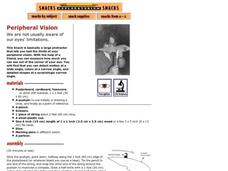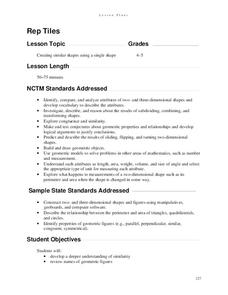K12 Reader
What’s Your Angle?
Start out with angles by asking your pupils to read this reading passage. Class members will learn about degrees, right angles, acute angles, and obtuse angles and then respond to five questions about the text.
Mathematics Vision Project
Module 5: Modeling with Geometry
Solids come in many shapes and sizes. Using geometry, scholars create two-dimensional cross-sections of various three-dimensional objects. They develop the lesson further by finding the volume of solids. The module then shifts to finding...
EngageNY
Complex Numbers and Transformations
Your learners combine their knowledge of real and imaginary numbers and matrices in an activity containing thirty lessons, two assessments (mid-module and end module), and their corresponding rubrics. Centered on complex numbers and...
Houghton Mifflin Harcourt
Unit 6 Math Vocabulary Cards (Grade 3)
A set of 49 math vocabulary cards ranges from angle to irregular polygon to parallel lines. Each sheet contains two cards: one with the word printed in bold text and the other with the definition.
101 Questions
Wedding Cake Ribbon
Customers often want ribbon around fancy cakes, but how does a baker know how much ribbon to buy? Scholars view a cake with multiple layers in different geometric shapes. They must figure the perimeter and circumference and add them...
Curated OER
Vocabulary and Concept Development: EDI
The roots metro/meter and therm are the focus of a vocabulary building presentation that includes concise definitions, color-coded examples, and opportunities for guided and independent practice. Part of a series of roots and affixes...
Houghton Mifflin Harcourt
Unit 5 Math Vocabulary Cards (Grade 6)
Acute angle, line of symmetry, and vertex are a few terms you'll find in a set of 90 flashcards designed to reinforce math vocabulary. Included in the set are two types of cards; a word card printed in bold font, and a definition card...
Sargent Art
Rainsticks
This rainstick instructional activity isn't just about making art; it's about understanding Native American symbols and culture. Kids read about the use of rainsticks and why specific symbols were used to decorate them. They then make...
EngageNY
The Motion of the Moon, Sun, and Stars—Motivating Mathematics
What does math have to do with the behavior of the earth and sun? Learn how the movement of celestial bodies has influenced the development of trigonometry. Scholars connects the details in mathematics to their real-world meaning.
K12 Reader
Where On Earth Are You?
What do we use to determine the exact locations on the earth? Your kids can learn all about compass roses and latitude and longitude. Test understanding with the five reading comprehension questions included on the page.
Willow Tree
Histograms and Venn Diagrams
There are many different options for graphing data, which can be overwhelming even for experienced mathematcians. This time, the focus is on histograms and Venn diagrams that highlight the frequency of a range of data and overlap of...
K12 Reader
How Things Move
As part of a comprehension exercise, kids read a physical science article about motion and then answer a series of comprehension questions based on the passage.
Exploratorium
Peripheral Vision
Life science learners discover the range of peripheral vision. They compare the angles at which they can detect motion, colors, and detailed shapes.
Cornell University
Constructing and Visualizing Topographic Profiles
Militaries throughout history have used topography information to plan strategies, yet many pupils today don't understand it. Scholars use Legos and a contour gauge to understand how to construct and visualize topographic profiles. This...
Curated OER
The Internet Pizza Server - Pizza Simulation
Learners simulate going to a pizza restaurant, ordering a pizza, and determining whether a small, medium, large, or family size pizza is a "better-buy." Students calculate the price/per/topping and determine whether this price is "fair"
Kelly's Kindergarten
April Daily Resources
Spring has sprung in your classroom! An entire month of activities relating to spring prompts learners to color, draw, write, and work on phonics.
Curated OER
Plotting Earthquakes
Learners plot earthquakes on a map. In this lesson on earthquakes, students will explore recent earthquake activity in California and Nevada. Learners will plot fault lines and earthquake occurrences on a map.
Curated OER
Apparent Motion of the Sun
Demonstrate the path of the sun across the sky at different times of the year with an engaging science lesson. Learners use a series of questions and diagrams to examine the movement of the sun and appearance of the sky around their...
National Security Agency
Partying with Proportions and Percents
Examine ratios and proportions in several real-world scenarios. Children will calculate unit rates, work with proportions and percentages as they plan a party, purchase produce, and take a tally. This lesson plan recommends five...
Science Friday
Wind Power
Blow away the competition with a lesson about wind power and turbines. Groups build windmills to test how the size of blades affect the amount of work done. The scholars build a variety of blades and collect data on how each type...
It's About Time
How Do Earth's Orbital Variations Affect Climate?
How does Earth's orbit around the Sun affect climate? This third installment of a six-part series looks at how Earth's orbit affects the amount of insolation at locations on Earth involves different experiments used in conjunction...
Curated OER
Schedules & Technology
Learn more about technology through matching, dictation, and word identification. English learners will participate in a variety of activities as they learn more about technology.
Improving Measurement and Geometry in Elementary Schools
Rep Tiles
In addition to the catchy title, this lesson plan provides upper graders an opportunity to more closely scrutinize the attributes of plane figures. In particular, they focus on the similarity of different shapes. Both whole-class and...
Curated OER
Ellipse Lab
Leading the students to draw a representation of ellipses of planets, this handout will help understanding the planet movement around the sun. There are ten questions about the analysis of those orbits and a conclusino specifically...

























